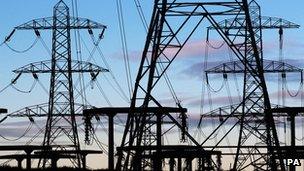Labour’s energy freeze: Fairness fights investment?
- Published
- comments

Household spending on energy has risen 18% since 2007
Ed Miliband's pledge to freeze power prices for 18 months if he becomes prime minister in 2015 can be seen as the first serious reversal of a trend stretching back a quarter of a century to progressively relax price controls on utilities, from telecoms to postal services to energy.
It breaks a cross-party consensus on this issue that has existed for not quite as long, in that there was initially great controversy over Margaret Thatcher's and John Major's privatisations and introduction of competition into markets dominated by former nationalised giants.
But with the election of Tony Blair as Labour leader in 1994, both major parties signed up to the idea that the best deal for consumers would most likely be delivered by freeing the marketplace - except in cases like rail, airports and water, where it proved impossible to foster effective challengers to local and national monopolies.
Pricey power
And for much of the late 1990s and early years of this century, the gradual rolling back of regulatory controls on prices seemed to work in the national interest: prices for power (and telecoms) fell; customer service improved.
All that changed with the onset of the Great Recession in 2008.
Because while hundreds of thousands of people lost their jobs and wages stagnated, energy prices continued to rise, taking an ever greater and less affordable share of squeezed pay packets.
Since 2007, according to the Office of National Statistics, the share of what all households spend taken by energy has risen 18% - and for the poorest 10% in the UK, energy bills in 2012 represented a substantial 7.85% of spending, up from 6.38% five years earlier.
Against this backdrop of pricey power, perceptions of the six energy giants became much more negative.
And concerns increased, including at the energy regulator Ofgem, of a wholesale energy market that is insufficiently transparent and may be vulnerable to rigging.
What particularly rankled with many was the idea, that became taken as accepted truth, that when wholesale prices fell, energy companies were slow to cut what they charge millions of us - but that they didn't hang around pushing up tariffs in a rising market.
Red hot
Do the energy companies profiteer?
They argue that they earn no more than they need to do, to pay for necessary investment in additional power-generating capacity and security of supply.
And they would say that their ability to make this investment has been undermined by uncertainty since the last election over their obligations to invest in low-carbon energy and what fraction of the cost of low-carbon energy they can recoup from consumers and businesses.
So here's where the debate about the price freeze will glow red hot.
The boss of one of our biggest power companies has already said to me that the prospect of a Labour government instructing him what he can charge will put even the diminished investment plans of his business on hold.
And if there were such an investment hiatus across the industry, the imperative of replacing obsolete and CO2-spewing generators would not be met.
With the energy regulator having warned that spare electricity capacity could fall to 2% by 2015, you can expect energy companies to warn that a price freeze would come at the risk of the lights going out.
Which brings the prospect of energy companies forming an alliance against Labour with a coalition government that - until today at least - was regarded with wariness bordering on contempt by many energy bosses.